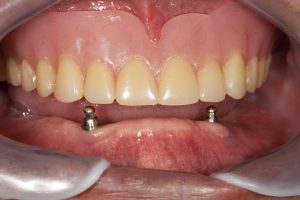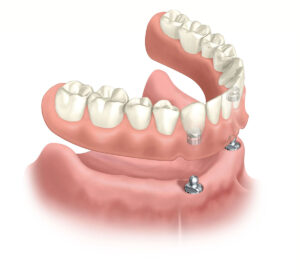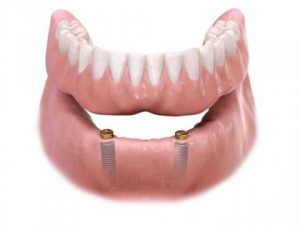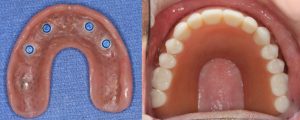
Struggling with dentures that won’t stay in place? Implant retained dentures offer a solution to the common frustrations of traditional dentures. They are securely anchored to the jaw, providing a comfortable, stable fit without slippage.
This article explores the essential benefits of implant retained dentures, the straightforward process behind implant retained denture, and who is an ideal candidate, giving you the knowledge needed to make an informed decision about your oral health.
Key Takeaways
- Implant retained dentures provide a secure and comfortable fit by anchoring to the jawbone, offering better stability and oral health benefits compared to traditional dentures.
- Candidates for implant retained dentures require sufficient jawbone density and healthy gums, and the process involves a thorough examination, surgical implantation, and attachment of the dentures.
- While the upfront cost of implant retained dentures can be significant, the long-term benefits of improved quality of life, preserved jawbone integrity, and overall self-confidence can make it a worthwhile investment.
Understanding Implant Retained Dentures
 Imagine dentures that provide enhanced security, firmly anchored to your jawbone, never slipping out of place. That’s the beauty of implant retained dentures. They offer stability and comfort that conventional dentures simply can’t compete with, leaving you worry-free during your day-to-day activities.
Imagine dentures that provide enhanced security, firmly anchored to your jawbone, never slipping out of place. That’s the beauty of implant retained dentures. They offer stability and comfort that conventional dentures simply can’t compete with, leaving you worry-free during your day-to-day activities.
These dentures, also known as implant supported denture, are attached to the implants in the jawbone using abutments, ensuring a secure fit. Implant supported dentures offer an ideal balance between stability and affordability, as they require fewer implants than other implant-supported dentures. So, you enjoy the confidence of a secure, natural-looking smile without breaking the bank. Temporary dentures can be a solution before transitioning to implant supported dentures.
The Basics of Implant Retained Solutions
Implant retained dentures are more than just a prosthetic; they’re a sophisticated dental solution. Their success lies in the process of osseointegration. This process allows the jawbone to grow around the implants, creating a strong foundation for the dentures. It’s like giving your dentures roots to hold onto, just like natural teeth. If you’re considering dental implants in Rockville, this advanced solution offers the stability and comfort you need to restore your smile.
The process of getting implant retained dentures involves the following steps:
- Implants are surgically placed into the jawbone.
- The dentures are then connected to the implants using abutments. These small posts protrude from the implants and serve as a pivotal connection point for securing the dentures.
- This connection is what offers the impeccable stability of implant retained dentures.
Types of Attachments: Ball vs. Bar Retained
Choosing the right type of attachment can greatly influence the stability and comfort of your dentures. Attachments for dental prosthetics can broadly fall into two categories: ball retained and bar retained. Each type serves its own purpose and offers unique benefits for the patient. Dentures with ball-shaped connectors can be attached to dental implants using specially designed sockets, providing a secure and stable connection. This design ensures a comfortable fit for the dentures and enhances the functionality of the implants. This ensures a secure fit that can withstand the forces of chewing and speaking.
Alternatively, bar retained dentures are secured by clipping onto a fixed bar that runs along the jawbone and is connected to the implants. The choice between ball or bar retained dentures can influence the stability of the denture, which in turn affects your ability to chew effectively. So, it’s not just about comfort, but also about enjoying your favorite meals.
The Procedure: From Initial Consultation to Final Fit
Embarking on the journey towards implant retained dentures begins with a thorough examination and consultation with your dentist. This initial step is crucial to understand the condition of your oral health and to create a custom-tailored treatment plan for you.
Once the initial consultation is done, the next step is the dental implant placement, which involves the surgical insertion of implants into the jawbone. This is followed by a healing period of three to six months, during which the implants integrate with the jawbone. After the healing is complete, the implants will have abutments placed on them. Following this, the artificial teeth or final dentures can be attached.
From consultation to final fit, the procedure is carried out with precision and care, ensuring a comfortable experience and a perfect fit.
The Benefits of Choosing Implant Retained Over Traditional Dentures
With implant retained dentures, the benefits go far beyond aesthetics. They are designed to offer an enhanced quality of life by providing a stable, comfortable fit that prevents shifting, slipping, and wobbling during activities like chewing and speaking. In short, they’re designed to feel like a part of you.
Contrary to traditional dentures, implant retained dentures offer several advantages:
- Alleviate irritation on the gums, providing a more comfortable wearing experience
- Direct attachment to the jawbone helps to preserve jawbone integrity
- Avoids the bone loss often associated with traditional dentures
Plus, with their durability and low maintenance needs, implant retained dentures provide a strong oral foundation that enhances the overall quality of life for wearers.
Enhanced Chewing and Digestion
One of the key benefits of implant retained dentures is their positive impact on chewing and digestion. Thanks to the secure attachment provided by the implants, these dentures enhance the ability to chew a wider range of foods effectively, including:
- meats
- raw vegetables
- nuts
- fruits
- crunchy foods
Improved chewing ability can lead to better digestion and overall oral health, including the health of your gum tissue.
This secure fit also offers the following benefits:
- Reduces the likelihood of food particles getting trapped under the denture, a common issue with traditional dentures
- Allows you to enjoy your meals without worrying about discomfort or the need for frequent adjustments
- Enables you to eat a wider variety of foods, leading to improved dietary options and overall nutrition.
So, with implant retained dentures, every meal can be a feast!
Boost in Self-Confidence and Quality of Life
 Implant retained dentures are not just about functionality; they’re also about confidence. Designed to closely resemble natural teeth, these dentures significantly enhance the wearer’s self-esteem. After all, a confident smile is the best accessory one can wear.
Implant retained dentures are not just about functionality; they’re also about confidence. Designed to closely resemble natural teeth, these dentures significantly enhance the wearer’s self-esteem. After all, a confident smile is the best accessory one can wear.
Moreover, implant retained dentures provide a seamless transition in daily activities. Whether it’s speaking, eating, or simply going about your day, you won’t have to worry about your dentures slipping or causing discomfort. This ease of everyday use leads to increased life satisfaction, making implant retained dentures more than just a dental solution – they’re a lifestyle upgrade.
Long-Term Oral Health and Bone Preservation
The benefits of implant retained dentures extend to the long-term preservation of oral health and bone density. Dental implants, including dental implant options, mimic the stimulation of nerves in the jawbone, just like natural teeth roots, thereby preventing bone loss.
By preserving jawbone density, implant retained dentures offer the following advantages over conventional dentures:
- Help prevent changes in facial structure
- Add volume to the facial structure, combating premature aging often associated with tooth loss
- Provide a beautiful smile and a youthful appearance
Suitability and Candidacy for Implant Retained Dentures
While implant retained dentures offer numerous benefits, they may not be for everyone. Certain factors play a crucial role in determining if you’re a suitable candidate for this dental solution. These include:
- Adequate bone density
- Healthy gums
- Good general health
- A willingness to commit to the treatment process
Lifestyle modifications, such as quitting smoking, may also be necessary to enhance the viability and success of implant-retained denture treatment.
Patients with chronic health conditions like diabetes or heart disease may need additional treatments or management to qualify for implant-supported dentures. However, with the right care and treatment plan, a broad range of dental situations can be catered to, making implant retained dentures an effective solution for many.
Evaluating Jawbone Condition
The condition of your jawbone is a crucial factor in determining your suitability for implant retained dentures. To qualify, an individual must have sufficient jawbone to support the implants. This is where a thorough examination by your dentist comes into play.
In cases where the jawbone is weak or unhealthy, the risk of implant failure increases. Individuals with reduced jawbone density may require additional procedures like bone grafting or sinus augmentation to become suitable candidates for implants. So, while the process may seem daunting, the results can be life-changing.
Assessing Gum Health and Lifestyle Considerations
The health of your gums is also a determining factor for implant retained dentures. Routine dental visits are crucial for assessing the health of the gums and implants. These assessments help determine if you’re a good candidate for this dental solution.
Lifestyle considerations, such as smoking, can also impact your suitability for implant retained dentures. Smoking can impede the healing process post-implant surgery, potentially leading to complications. Therefore, if you’re a smoker considering implant retained dentures, quitting smoking will likely be a part of your treatment plan.
Cost Analysis: Implant Retained Dentures Investment
Investing in implant retained dentures means investing in your health, confidence, and quality of life. While these dentures typically range from $5,000 to 30,000, the cost can vary depending on various factors such as:
- the cost of implant posts
- the type of implants
- the quality of dentures
- any necessary preparatory procedures
When compared to other full arch rehabilitation treatments, implant retained dentures offer a more affordable solution. They’re more cost-effective compared to treatments like multiple implants or All-on-Four. So, while the initial investment may seem substantial, the long-term benefits and savings make it a worthy investment.
Understanding the Financial Commitment
The financial commitment involved in getting implant retained dentures can vary. The cost of denture implants typically starts at around $5,000 but can reach up to $30,000 in certain cases, with the average around $15,000.
The cost can also be influenced by the dentist’s reputation and expertise, as more experienced dentists tend to charge more due to their ability to minimize complications. The quality of the denture materials and the number of implants required can significantly influence the overall cost of the procedure. Therefore, it’s important to have a comprehensive discussion with your dentist to understand the financial commitment involved.
Comparing Costs with Other Dental Prosthetics
When comparing the costs of implant retained dentures with other dental prosthetics, it’s important to note that costs can differ significantly based on geographic location, influenced by local market rates. For instance, implant retained dentures cost between $5,000 to $30,000 in regions with a high cost of living like the United States and Mexico, with more affordable prices available in countries such as India and Turkey.
While the initial cost might seem high, it’s important to consider the long-term benefits of implant retained dentures. They’re designed to last for decades with proper care, providing a lasting solution for missing teeth. So, when you compare the longevity and quality of life improvements with the one-time cost, you might find that implant retained dentures offer excellent value for money.
Maintenance and Care for Your New Dentures
Care and maintenance are key to ensuring the longevity of your implant retained dentures. Implant-supported dentures have the potential to last for 10 to 20 years when properly cared for. Regular maintenance and good oral hygiene can contribute to their longevity. So, how do you ensure they stay in top shape?
Whether fixed or removable, your dentures require daily cleaning. For fixed dentures, use a soft-bristled toothbrush and non-abrasive toothpaste to clean along the gum line and beneath the prosthetic teeth. For removable dentures, in addition to brushing, they should be soaked in a special cleaning solution when not being worn. This helps to maintain hygiene and prolong the life of your dentures.
Daily Cleaning and Hygiene Practices
Maintaining daily cleaning and hygiene practices for your implant retained dentures is essential for their longevity. For fixed dentures, use a soft-bristled toothbrush and non-abrasive toothpaste. Take care to brush around the components, gum areas, and artificial teeth as well as cleaning the abutments in the mouth.
If you have removable implant-supported dentures, they must be taken out daily for cleaning with a toothbrush. Additionally, they should undergo a weekly soak in a specialized denture-cleaning solution. This routine helps to maintain hygiene and ensures your implant retained dentures stay in top condition.
Regular Dental Check-Ups and Adjustments
Routine dental visits are crucial for the proper maintenance of your implant-retained dentures. During these visits, your dentist will:
- Clean the implants
- Remove any plaque or tartar that has built up
- Check for any potential damage or issues that could affect the longevity of your dentures.
Your dentist can also remove fixed implant-supported dentures for thorough cleaning and any necessary adjustments. These regular check-ups not only ensure your dentures are functioning properly but also allow your dentist to address any potential issues early, ensuring your dentures continue to serve you well for years to come.
Real-Life Experiences: Patient Testimonials
Nothing speaks louder than the experiences of those who have walked the path before. Patients who have transitioned to implant retained dentures have expressed high satisfaction with the fit and function of their new smiles. They particularly note the secure fit of lower partials and the ability to enjoy a variety of foods.
Here are some testimonials from patients who have had positive experiences with Rockville Dental Arts:
- One patient, after a 25-year relationship with the clinic, had an excellent experience with bar-retained implant dentures, enhancing their bite and smile.
- Another patient, after four years with implant-retained dentures, acclaimed the implants as feeling better than their natural teeth, highlighting the improved quality of life.
- The personal and professional aftercare service from the clinic has also been highly praised, reflecting the overall satisfaction with the experience.
See our Smile Gallery for more before and after implant retained dentures.
Summary
Implant retained dentures offer a transformative solution for those seeking to enhance their smiles and quality of life. From improved stability and comfort to aesthetics and longevity, these dentures offer advantages that traditional dentures simply can’t match. They’re more than just a dental solution; they’re an investment in your health, confidence, and happiness.
Whether you’re considering transitioning from traditional dentures or seeking a solution for missing teeth, implant retained dentures could be the answer you’ve been looking for. With the right care and maintenance, they can serve you well for decades, ensuring you can share your joy with the world – one smile at a time.
Frequently Asked Questions
What makes implant retained dentures different from traditional dentures?
Implant retained dentures differ from traditional dentures by providing enhanced stability and comfort, as they are directly attached to the jawbone, preventing shifting and slipping during activities. Additionally, they help preserve jawbone integrity and prevent bone loss.
What does the procedure for getting implant retained dentures involve?
The procedure for getting implant retained dentures involves an initial consultation and examination, surgical placement of implants, a healing period of three to six months, and finally, attachment of the dentures to the abutments placed on the implants.
Who can get implant retained dentures?
You can get implant-retained dentures if you have adequate bone density, healthy gums, and good overall health, and are willing to commit to the treatment process. Lifestyle changes like quitting smoking may also be necessary.
How much do implant retained dentures cost?
Implant retained dentures can cost between £8,000 to £9,000, and the final price depends on factors such as the type of implants, the quality of dentures, and any necessary preparatory procedures.
How should I care for my implant retained dentures?
To care for your implant retained dentures, make sure to clean them daily with a soft-bristled toothbrush and non-abrasive toothpaste. Additionally, regular dental check-ups and adjustments are important for their longevity and proper functioning.





